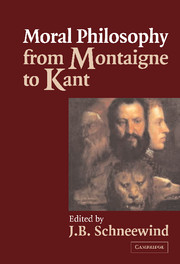Book contents
- Frontmatter
- Contents
- Preface
- Acknowledgments
- Foreword to the One-Volume Reprint
- Introduction
- PROLEGOMENA: SOME QUESTIONS RAISED
- PART I REWORKING NATURAL LAW
- PART II INTELLECT AND MORALITY
- PART III EPICUREANS AND EGOISTS
- Pierre Gassendi
- Pierre Nicole
- Bernard Mandeville
- John Gay
- Claude Adrien Helvétius
- Paul Henri Thiry, Baron d'Holbach
- William Paley
- Jeremy Bentham
- PART IV AUTONOMY AND RESPONSIBILITY
- Supplemental Bibliography
John Gay
Published online by Cambridge University Press: 05 June 2012
- Frontmatter
- Contents
- Preface
- Acknowledgments
- Foreword to the One-Volume Reprint
- Introduction
- PROLEGOMENA: SOME QUESTIONS RAISED
- PART I REWORKING NATURAL LAW
- PART II INTELLECT AND MORALITY
- PART III EPICUREANS AND EGOISTS
- Pierre Gassendi
- Pierre Nicole
- Bernard Mandeville
- John Gay
- Claude Adrien Helvétius
- Paul Henri Thiry, Baron d'Holbach
- William Paley
- Jeremy Bentham
- PART IV AUTONOMY AND RESPONSIBILITY
- Supplemental Bibliography
Summary
Introduction
John Gay was born in 1699 and died in 1745. He taught briefly at Cambridge and spent most of his life as pastor in a country parish. His dissertation “Concerning the Fundamental Principle of Virtue or Morality” was published in 1731 as a preface to a translation of a Latin treatise on the problem of evil. Although Gay wrote one other philosophical essay, it is for the dissertation that he is remembered.
Gay's essay is an attempt to solve a problem concerning morality and our motivation to act as morality requires. Like Gassendi, Hobbes (in some of his statements), Mandeville, and many others, Gay thought that all voluntary actions are undertaken for the sake of some benefit to the agent. With Hutcheson, however, he believed that virtue requires us to act for the sake of the good of others. He also accepted Hutcheson's antiegoistic claim about the way our motivation at least seems to us: that we do in fact sometimes act for the sake of bringing good to others. Thus Gay's psychology apparently makes virtue impossible and contradicts the plain facts about human motivation. Would it not be reasonable, then, to abandon the theory? Gay, however, did something more interesting.
He agreed with Hutcheson's data regarding how our motivation seems to us but denied that they were ultimate. Our apparently disinterested motivation therefore can be analyzed into self-interest as it is affected by special circumstances leading us to associate the idea of helping others with the idea of attaining our own good.
- Type
- Chapter
- Information
- Moral Philosophy from Montaigne to Kant , pp. 399 - 413Publisher: Cambridge University PressPrint publication year: 2002

